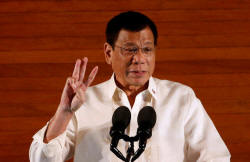|
Tackling vices one by
one, Philippines president targets online gaming
 Send a link to a friend
Send a link to a friend
 [August 11, 2016]
By Neil Jerome Morales and Farah Master [August 11, 2016]
By Neil Jerome Morales and Farah Master
MANILA/HONG KONG (Reuters) - After
unleashing a crackdown on drugs, Philippine President Rodrigo
Duterte is turning his guns on a booming online gaming industry,
abruptly scrapping one firm's 13-year monopoly this week and
denouncing its billionaire chief as a corrupt oligarch.
Until recently, Filipinos could gamble in licensed online cafes, as
well as casinos, but Duterte refused to renew the exclusive license
of the operator of more than 300 such cafes, Philweb Corp, after its
permit expired on Wednesday.
"With the strong and repeated pronouncement of the president, there
is no choice," Andrea Domingo, head of Pagcor, the state regulator
of casinos and online gambling, told Reuters.
Last week, Duterte, nicknamed 'the Punisher,' singled out Philweb’s
chairman, Roberto Ongpin, one of the richest men in the southeast
Asian nation, as an example of an oligarch who benefited while the
poor suffered.
Annual economic losses from halting Philweb’s contract and closing
down e-bingo outlets would be about 10 billion pesos ($214 million),
said Pagcor, which is a gaming operator in addition to its role as
regulator.

The Philippine gaming industry is one of Asia's most freewheeling,
attracting scores of online foreign companies over the last decade
to set up servers aimed at overseas punters, and has lured
investments of billions of dollars in casino resorts.
"I doubt if anyone expected what happened," said a former top
official at Pagcor, who asked not to be identified as he was not
allowed to speak to the media.
"It is not quite clear what the president really wants and what the
endgame is."
Duterte declared war on online gambling soon after being sworn in on
June 30, saying, "Online gambling must stop. It has sprouted here
and there. This is out of control."
Philweb's shares lost more than 50 percent to hit lows not seen
since 2008 after Ongpin resigned last week, telling shareholders he
hoped his action would help get the company's license renewed.
Philweb has started winding down operations and is working with
Pagcor to retain the jobs of its 5,000 employees.
"As we wind down the operations over the next few days, we will have
to assess what that means for our operations in the short term," its
president, Dennis Valdez, told reporters.
[to top of second column] |

Philippine President Rodrigo Duterte gestures during his first State
of the Nation Address at the Philippine Congress in Quezon city,
Metro Manila, Philippines July 25, 2016. REUTERS/Erik De Castro/File
Photo

REGULATOR ALSO LOOKING INTO FREEPORT ZONES
Pagcor is also looking into the activities of the Philippines' special freeport
zones that issue licenses to foreign online gaming firms, Domingo added.
The Philippines is the base for most Asian international online gambling
operators, who hold licenses issued by its Cagayan economic zone. These
operators, forbidden to accept bets from locals, have been allowed to keep
operating. "It’s business as normal for now," said Joe Pisano, chief executive
of Jade Entertainment and Gaming Technologies, based in the capital, Manila.
But Duterte's position on online gaming hosted in the Philippines for bettors
from overseas remains to be clarified, Pisano added. However, as the Philippines
looks to boost tourism, its burgeoning market for integrated casino resorts,
touted as a new Asian hotspot after Macau and Singapore, is unlikely to be
targeted, industry executives and Pagcor said.
Japanese billionaire Kazuo Okada is expected to open a $3-billion casino resort
in Manila’s Entertainment City by year end.
That will add to the flashy properties of Melco Crown’s City of Dreams Manila
and Philippine billionaire Ricky Razon’s Solaire property, controlled by
Bloomberry Resorts Corp, which have already opened.

"We are there to bring in foreign tourists and foreign dollars," said a
Manila-based casino executive who declined to be named, as he was not authorized
to speak to the media. "Electronic gaming can never take credit for that."
($1=46.7390 Philippine pesos)
(Editing by Clarence Fernandez
[© 2016 Thomson Reuters. All rights
reserved.] Copyright 2016 Reuters. All rights reserved. This material may not be published,
broadcast, rewritten or redistributed. |